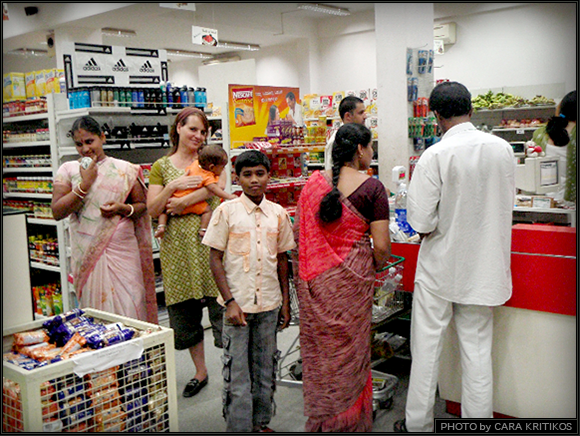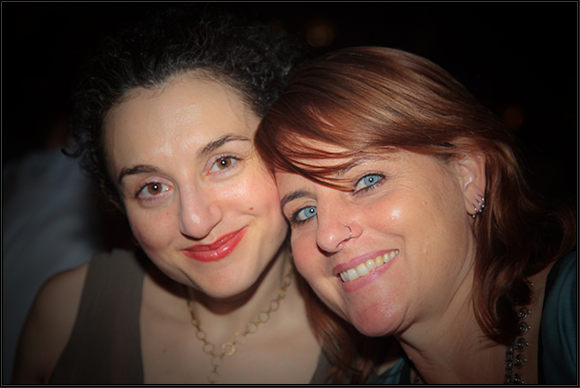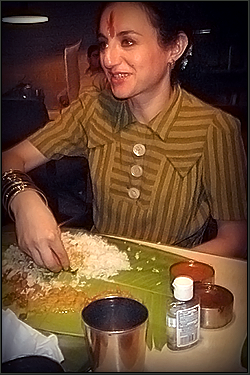.
[audio:Janes Addiction – Superhero.mp3]
.

.
In India there are as many distractions as there are people, and most of the time the distractions are the people.
Every morning I wake up early and launch myself out of bed to write before the house swirls into chaos. Writing is temperamental business and requires hours to stare into space, usually cyberspace – Facebook, MySpace, the New York Times, the Huffington Post, the Times of India, BoingBoing, etcetera – before getting started in earnest. After checking in on the Somali Pirates, and what the first lady is wearing and seeing if my people have anything interesting to say, I can become one with language and ink.
On a normal day, usually before the alchemical process of writing can actually begin, someone – could be anyone – will come walking into the room I’m hiding in that day.
Today I kissed Phil goodbye, made a pot of tea and crept back up to my bedroom, firmly committed to feigning malaria if that’s what it took to be left alone to write. Two minutes later Phil popped his head through the door and said, “You have to come see this.”
Reluctantly, resentfully, I head downstairs, as he’s not taking “piss off” for an answer.
Our driver, Bhaskar, is standing in the entry, beaming, with three children in front of him. “This is my family,” he announces. “Jashoria, Cynthia, and my nephew, Joseph,” he says, tapping each on the head with his oddly expressive hands. They are beautiful children – well dressed, mannered, and clearly excited to be meeting the white people that daddy babysits. Phil and I fawn over them and ask their ages: 17, 11 and 9. We take pictures and giggle. I am smitten; if I had planned things a little better, or even planned things at all, I would have had several more children.
“Okay, nice to meet you kids! I’ve got to get to work now,” Phil says.
“Okee okee,” Bhaskar says, and heads for the door with Phil, leaving the children behind.

.
The next thing I know I’m pinning the two younger ones into our swimsuits so they can play in the pool, and counseling the 17-year old on her college plans.
I sit down at the long dining room table and open my laptop, hoping to indicate that I’m going to work now. Jashoria sits down beside me and stares at me with deep brown eyes. She is adorable.
“I want to study computer science,” Jashoria says.
“What sort of computer do you use?” I ask, just to be polite.
“I’ve never used a computer, Auntie.”
Rathnama comes into the kitchen, her face puffy and pale. She is clearly ill. I put my hand on her forehead and it is scorching hot. We have no understanding of the other’s language, but somehow we find it fairly easy to communicate, and in any language, sick is sick. “Doctor,” I say, “We’ll take you to the doctor when Bhaskar gets back.” It has been an hour and a half since Bhaskar left to take Phil to work.
“Bhaskar asleep.”
“No, Bhaskar driving sir.” I often speak like a toddler these days.
“Bhaskar asleep.” She points to her apartment.
The maid is sick, the driver is asleep in the maid’s bedroom while his kids are in my swimming pool, the house is filthy, I am starving and I still haven’t written a damn thing. I see my day melting before my eyes. This pull between Western ambition and Eastern confusion lives in me daily. The more I push to write, the more India pulls me to live.
Bhaskar staggers sleepily into the kitchen. “We need to take Rathnama to the doctor,” I say.
“Okee okee,” he says, just like he always does. Phil and I have started to pick up on this strange verbal tick, “Okee okee,” along with shouting, “Baa! Baa!” when we pass cows on the road, and launching into, “No-no-no-nonono,” when what we really mean is, “No, thanks.” Aside from these verbal paroxysms in my daily struggle to communicate, my speech has developed an odd cadence and structure. The longer I’m here, what passes for normal becomes stranger and stranger.
I routinely say things like, “What is your age?”, “Cooking tonight for dinner, yes?” while holding up a head of cauliflower, and, “It is working now that I must do.”
I fear that after the year is out and I head home, I’ll be stuck with this mutant form of English painstakingly developed by necessity here, and the only place my language skills will make any sense at all will be at a call center.
I walk Rathnama to a chair and sit her down. I run upstairs and change out of my dressing gown. When I come back downstairs everyone is in the car: Bhaskar, three kids, the maid and me. There is no such thing as alone in this country. I travel with an entourage wherever I go; a trip to the drugstore for nail polish or to buy water becomes a social event. Normally it is Bhaskar and Rathnama. He walks in front like a bodyguard sweeping away autograph collectors. She walks behind and insists on carrying my bags. I am uncomfortable with this set-up, but they are even more uncomfortable when I venture out on my own. We have been given strict orders not to go out past 10 PM and not to ride in tuk-tuks. We routinely do both and lie about it.
The eldest daughter has positioned herself in the front passenger’s seat, cranks up the music and sings Hindi songs with the radio. The 9-year old boy, who’s been staring lustfully at my computer all morning, is now eyeing my iPod with that same desire. I cave and hand it to him, then show him how to play the Bubble Wrap game. I’m glad he doesn’t ask any questions because I’d have a hard time explaining why the game is fun.
We arrive at the local clinic and all six of us walk in. They bring Rathnama into the examination room and take her pulse. She won’t let go of my hand, so I stand between her and the doctor and three nurses who are evidently being paid to look concerned without actually doing anything. Two more nurses are standing by to replace two of the nurses who aren’t doing anything, when they get tired…of doing nothing. Doctor and patient can’t understand each other, often a problem between Indians. He speaks Kannada, but Rathnama speaks Telugu. From where I’m standing I should be translating but I don’t understand either.
After a brief examination the doctor sends the busload of us away with three prescriptions. The consultation fee is 60 rupees, about $1.20. At home this would have cost about $120. I pay 80 rupees for $80 worth of medicine.
I pay for everything, nearly all the time. Things are cheap here, but I am breaking all the rules. I buy my maid new shoes and saris; I suspect that I am feeding her whole family. I also suspect that I am creating more problems that I am solving. Rathnama had to hide her new sari from her nephew, who cleans our pool and feeds the dog, so he didn’t get angry at her for getting special treatment, and her husband insisted she buy him new shoes when he saw that she had a new pair.
We get home and I put the maid in the guest room, another clear boundary breach, but it is sweltering in her tiny cement room. Two of the kids jump back into the pool and the teenager gets back on the phone. The dog steals a chapati off the counter, next door the cement mixer grinds and the workers shout to each other in several different languages. The house is dirty, I am hungry, I try to call Phil but my phone is out of juice and I still haven’t managed to write.
After the swim and the 14th phone call of the day the sisters find me in my bedroom, where I am once again trying to write. “We need to wear your dresses,” the older one announces. Her words are delivered with such certitude that I’m sure it is I who is lacking knowledge of local Indian customs, and not these pint-sized cherub-monsters who are lacking in manners. I ask why, and suddenly they don’t understand my English. “Your clothes Auntie. We need to wear your clothes.”
Again, I ask why and they just look bewildered. But instead of pushing deeper, or standing my ground, or just saying, “No you can’t wear my clothes. What the hell are you thinking?” I simply open my closet doors and start pulling out dresses. I dive in to the game of “white lady dress up” fully and with fervor. This is a blast. I feel like Auntie Mame, or the big sister in a huge family, like I am the fun-loving mother of many, many children. I slip and button and tie. I teach them both to balance in heals. I take the jasmine out of the 17-year old’s hair and tussle it to one side so she looks like American jail bait. I stop short of slathering them with lip-gloss and nail polish before the spell wears off.
I send them downstairs to show their father (who is again napping in the maid’s room) their Western makeovers. I assume they will come back upstairs, change back into their own clothes, and if I’m really lucky, go home.
A few moments later they burst back into my bedroom, where I am again trying to write. “Auntie, we’re spending the night to take care of Rathnama!” This one sentence changes everything. Within the span of ten words these adorable girl children who call me “auntie” are now the only thing standing between me and literary world domination. In my head, they incur the wrath of three months worth of South Asian interruptions. They are horns and smog, belching shoppers, suspicious water bottles, those infuriating guys who try to sell you tiny drums. They are garbled English and misspelled names. They are the lying, cheating tuk-tuk drivers. They are EVERYTHING that is wrong with this country!!!
I’ve never been good with boundaries. I am, however, quite good at seething silently while people run roughshod over my life. I don’t know how to say no and I can’t stop saying yes. I look back over the past months and realize piece by piece that I have made this happen. Sure, I mentioned to our driver that we’d love to meet his children sometime. And yeah, when they arrived I was all smiles and, “Sure kids, play in the pool,” and “Let’s figure out what you’re going to be when you grow up.”
The next day the girls get up before me and eat last night’s leftovers for breakfast. And from the cookie and candy wrappers scattered in the entry hall and on the front porch, it appears they have done a fine job of cleaning anything edible from the cupboards as well. They are both still wearing my dresses, now wrinkled from sleep and splotched with food and soda stains.
There is nothing cute about any of this anymore. I force a smile and apologize that I won’t be able to play with them today, explaining that I have a ton of work to do. I then lock myself in the soundproof room until late in the afternoon and finally manage to get some work done while they tear apart the house, the maid sleeps medicated in the guest bed, and Bhaskar sleeps out the heat in the maid’s bed.






